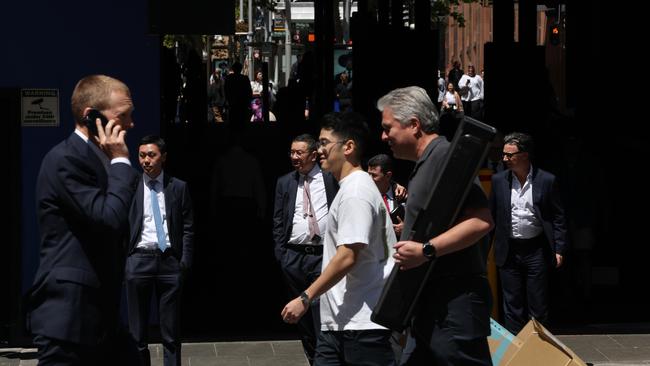SA Business Chamber slams Fair Work Commission work-from-home ‘overreach’
A right to work from home is being considered under employment law changes condemned by employers as a needless government intrusion.
SA News
Don't miss out on the headlines from SA News. Followed categories will be added to My News.
Business is condemning needless government overreach into work-from-home arrangements, saying this piles on excessive bureaucracy to deals that should be struck flexibly between workers and employers
Millions of Australians could have the right to work from home under major changes being considered by the nation’s employer watchdog, which could form the basis for new workplace laws.

The Fair Work Commission is looking whether flexible work arrangements could be a legal entitlement just one month after new laws passed allowing workers to ignore calls and texts from their bosses after hours.
About 2.2 million workers on award wages could be impacted by the findings of the review, which is also looking at a range of other workplace issues, and is infuriating business groups opposed to the federal government’s sweeping workplace reforms.
The review will make recommendations to the federal government, which will then consider the findings and put legislative changes to parliament accordingly.
South Australian Business Chamber chief executive officer Andrew Kay said this was another instance of governmental overreach into areas where involvement should be unnecessary.
“There is no one-size-fits-all approach to working from home. The purpose of awards is to establish overarching standards applicable across entire industries,” he said.
“However, the nature of working arrangements within specific sectors is highly dynamic and should ideally be the subject of negotiations between employers and employees, considering the nature of their work.
“I’m sure that businesses already grappling with the complexity of modern awards would be questioning how this could possibly play out in practice.”
Chief executive of the national employer association, Ai group, Innes Willox, said there was “a clear risk of regulatory overreach and intrusion into how businesses and their employees organise themselves”
“At risk is flexibility and productivity, which make Australia more competitive and its workforce better positioned for sustainable wage increases. It is critical that the FWC takes full account of impacts of additional regulatory burdens and the diversion of management time and resources away from activities relating to job creation, investment and innovation. “Australia is feeling the consequences of very low productivity growth. We all need to be wary of legislation and regulation that relegates productivity to the back burner.”
Workplace Minister Tony Burke said there were plenty of examples where working from home brought “mutual benefit” to both workers and employers and urged businesses to be open to discussions.
“It makes sense that the Fair Work Commission is saying okay, let’s check and work through submissions and see how that fits through the awards system,” he said.

Currently, about 37 per cent of Australians currently work from home regularly, according to the most recent data from the Australian Bureau of Statistics, down slightly from 2022 levels. Workers do not currently have a general right or entitlement to work from home in Australia – but can request to work from home under certain conditions if they have been with their employer for at least 12 months.
Research from the Melbourne Institute shows that the majority of Australian workers want the right to work from home at least partially, with 60 per cent happy with a hybrid work arrangement where they work from both home and in the office.
Quizzed about the possibility of new working from home laws, Prime Minister Anthony Albanese said remote working was a very positive development to come out of Covid-19 particularly for working mothers – but warned against workplaces using a “one size fits all” approach.
“I think that it is important, from at least time to time that people gather in one place so they can have that social interaction,” he told reporters in Sydney.

Opposition Leader Peter Dutton said while he supported flexibility for workers, he held concerns about the impact decreased productivity would have on the economy.
“We have to be careful that the Albanese government just doesn’t side with the unions on every occasion, because all that happens is if the price of wages go up too dramatically in an inflationary environment you will end up with much higher prices for consumers,” Mr Dutton said.
A discussion paper released by Fair Work in January pointed to evidence showing that remote work did not impede on workers’ overall productivity levels, instead suggesting that it carers and parents more time to juggle the demands of home and work.
The paper said remote working did raise many challenges for employers – however – including making it more difficult for bosses to facilitate on-the-job mentoring and initiate “spontaneous collaboration.”
“Improved flexibility as to when and where people work may also create ambiguity as to when workers can disconnect from work, which can impact on wellbeing,” it said.
More Coverage
Read related topics:Cost of Living




